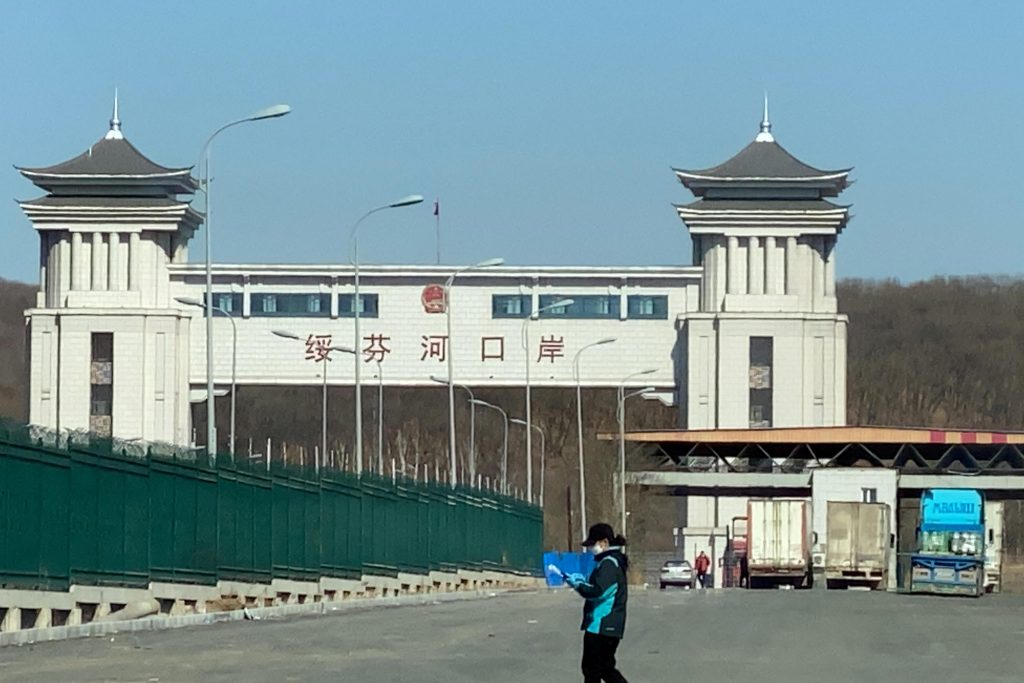As the coronavirus spread in Russia, a group of 500 Chinese residents of Khabarovsk city in the Far East decided to lock themselves inside an apartment block, imposing a regime of self-isolation that has been in place since April 1.
“Of course we are dying to go home,” 50-year-old Liu Haijun, a native of the northeastern Chinese border city of Suifenhe, told Reuters by phone from the building called the Tianyu Guesthouse.
“But with the border closed and flights cancelled, and rumours of people getting infected on the journey back, and because my business is here, we just have to stay put in Russia and keep ourselves safe,” he said.
The worsening outbreak in Russia has forced the roughly 150,000 Chinese citizens living there to decide between sheltering in place or trying to cross back into China, where the coronavirus has been curtailed by drastic containment measures.
Thousands have opted to return home, including 2,443 at Suifenhe, bringing a wave of infections with them that forced authorities to close the border this month and put the city into virtual lockdown. Shutters were closed and doors bolted on most shops on Thursday.
Liu said that most Chinese people in Russia are acutely aware of how the epidemic ravaged the Chinese city of Wuhan.
“But most Russians don’t know this. They still go around not wearing masks, kissing and greeting. If one catches the virus, many will surely catch it too,” said Liu, who has run a garment trading business in Russia for 23 years.
President Vladimir Putin ordered many Russians to work from home from April 1 and authorities have locked much of the country down, with people told to keep their distance from others and food stores imposing strict social distancing rules. Many Russians can be seen wearing masks, although many pharmacies say they have long run out of stock.
On Thursday, Russia reported 3,448 new cases, bringing the total to nearly 28,000.
Moscow has chafed at criticism from China over its handling of the virus. China’s Global Times, run by the ruling Communist Party’s official People’s Daily, recently suggested Moscow had failed to do enough to halt the spread of the virus.
“We can hardly agree with such criticism,” Kremlin spokesman Dmitry Peskov said on Wednesday.
China has barred entry to foreigners and is scrambling to intercept “imported” cases among returning Chinese. Shanghai authorities said this week that 60 people arriving there on an Aeroflot flight from Moscow last Friday have the coronavirus.
WUHAN-STYLE LOCK-IN
When the Chinese owner of the guesthouse in Khabarovsk proposed in a WeChat group that his residents undergo voluntary lockdown, nearly everyone went along with it, Liu said.
“The gates are electrically locked by the guesthouse owner. If you enter you cannot leave. If you leave you cannot return. We don’t want anyone to bring the virus in,” he said.
The set-up is similar to what happened in Wuhan, a city of 11 million.
Residents buy necessities at an on-site mini-mart. For anything else, the guesthouse owner takes orders and makes deliveries to the gate.
Although not enforced by the guesthouse, residents follow the health tips encouraged in China – wearing masks and practising social distancing when strolling in the car-park.
Liu said that staff from the Chinese consulate in the city had visited recently to collect identification details and tell residents to be in touch if they need assistance. Local authorities had not been in touch, he said.
GETTING OUT
But Wang Jingwen, who had been working as a tour guide in St. Petersburg for two years, decided to leave because business was bad and she was not confident the Russian healthcare system could cope in the event of a massive outbreak of COVID-19.
In late March, she flew from St. Petersburg to Novosibirsk, and then to Vladivostok, where she joined other Chinese on a three-hour bus ride to Suifenhe.
“I travel frequently for work but this is the first time I was truly overjoyed to see the words ‘China Customs’,” Wang, 33, told Reuters by phone.
At the Suifenhe checkpoint, she gave her travel history and health details and had a cotton swab stuck down her throat for testing. She was quarantined in a hotel for 14 days, reporting her temperature daily.
After passing two nucleic acid tests, she was released and is now home in the southwestern city of Chengdu.
Liu, the garment trader, wants to go home too.
“My parents are old and ill. If someone is willing to take my stock for half the price, I would sell in a heartbeat to go home to them,” he said.
Interactive graphic tracking global spread of coronavirus: open tmsnrt.rs/3aIRuz7 in an external browser.



